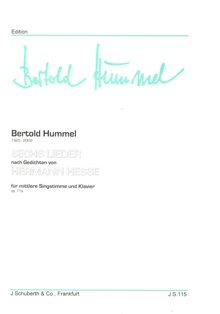6 Songs after poems by Hermann Hesse (in German) for Medium Voice and Piano, op. 71a (1978)

1. Im Nebel
2. Handwerksburschenpenne
3. Blauer Schmetterling
4. Nachtgefühl
5. Irgendwo
First
performance: October 22, 1981, Würzburg, Gartenpavillon des Juliusspitals
Herbert
Roth / Arno Leicht
Dedication: for Herbert Roth
Duration: 20 Minutes
Publisher: Schott Music ED 20287 / ISMN: M-001-14992-1
| Nr. 1 Im Nebel | Nr. 2 Handwerksburschenpenne | Nr. 3 Blauer Schmetterling | Nr. 4 Nachtgefühl |
The basis
of the first Lied Im Nebel (Within the mist) is a short series of
notes which has already been heard in the opening bars of the piano, moving simultaneously
from a high note towards the bass and from a low note towards the treble, so that
the resulting chords hover and swim like banks of mist.
In the Handwerksburschenpenne
(Journeyman's Lodging), one thinks one is hearing a marching song, but the
music repeatedly breaks out of the stiff rhythm, the "secret pain"
that tortures one of the three journeymen is present in almost every bar of the
music.
The third song, Blauer Schmetterling (Blue Butterfly) is
as if painted with a few daubs of colour. The captivating harmonies of the piano
resolve twice into a high note which is left to fade almost to silence. Above
these, the voice glides and hovers, almost more reciting than singing.
Nachtgefühl
(Night feeling)is the central piece in the group of songs, not only in
terms of the point in time, but also because here the voice and the piano accompaniment
provide a climax in intensive expression and an orchestral, almost operatic concentration
of sound.
The song Irgendwo (Somewhere) forms a single
large musical arch going from powerful agitation to motionless quiet. In the final
bars, at the words "Nacht und Sterne" ("Night and Stars"),
a chord in the piano containing simultaneously all 12 notes of our musical system
is heard. Thus are the perfection and completeness of the starry heavens symbolically
represented.
The poem Manchmal (Sometimes), the basis
of the last song, speaks of the experience that man can become one with nature
if he immerses himself in it, and that he can thereby be changed. This is a thought
that runs through the poetry of Hermann Hesse like a solemn fundamental harmony.
Often, there are hints, as in this poem, of the mythology of the transmigration
of souls. Through its music, the song makes the call of the birds as well as the
blowing of the wind perceptible. With an unresolved chord, the work closes, like
a question for which no answer has been found.
Arno
Leicht
Translations:
1. Within the mist
To
wander alone in the mist,
Every bush and stone on its own,
No tree sees
another
Everything is alone.
My world was filled with friendship,
While
my life was still alight,
Now that the mist has fallen,
There is no one
in sight.
No one is truly wise,
Who does not understand the darkness,
that
ultimately and quietly
Separates us all.
Wandering isolated in the
mist,
The mist that is so lonely,
No one knows the other,
Everyone alone.